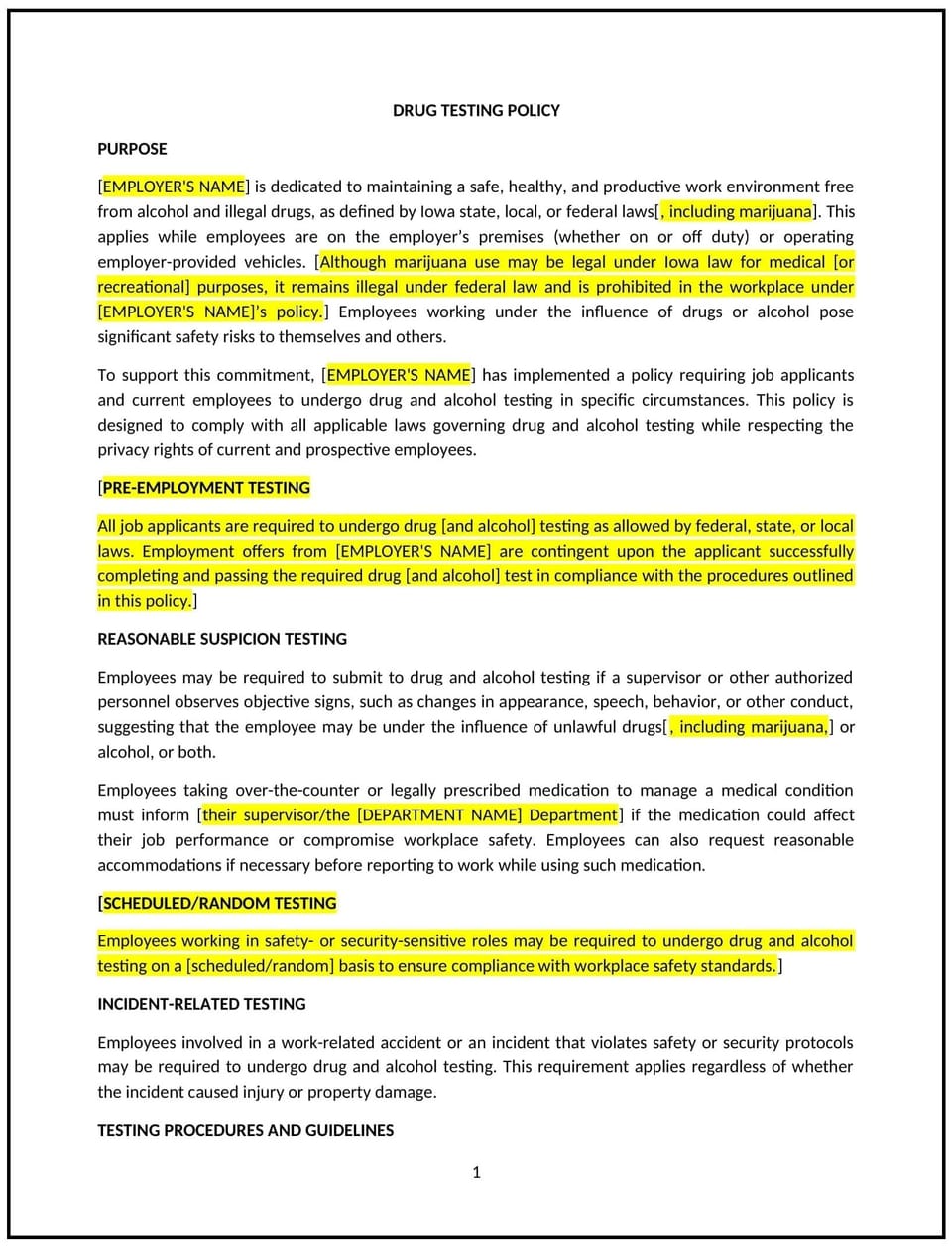Drug testing policy (Iowa): Free template

Drug testing policy (Iowa)
A drug testing policy helps Iowa businesses establish clear guidelines for maintaining a safe and productive work environment by outlining when and how employees may be tested for drug or alcohol use. Businesses may implement drug testing to promote workplace safety, comply with industry standards, or address performance concerns.
This policy defines testing procedures, employee rights, and expectations for handling positive test results. It provides businesses with a structured approach to ensuring workplace safety while respecting employee privacy.
By implementing this policy, businesses in Iowa can reduce workplace risks, improve job performance, and create a drug-free work environment.
How to use this drug testing policy (Iowa)
- Define testing circumstances: Specify when drug testing may occur, such as pre-employment, random testing, reasonable suspicion, post-accident, or return-to-duty testing.
- Establish testing procedures: Outline how tests will be conducted, which substances will be screened, and which testing methods (urine, saliva, hair, etc.) will be used.
- Set employee notification requirements: Inform employees of drug testing expectations during onboarding and policy updates.
- Address confidentiality protections: Ensure that all drug test results are handled securely and shared only with authorized personnel.
- Outline consequences of positive tests: Specify potential actions, such as further evaluation, rehabilitation programs, or disciplinary measures.
- Provide an appeal process: Allow employees to dispute test results or request a retest if applicable.
- Offer support resources: Encourage employees to seek help through employee assistance programs (EAPs) or substance abuse resources.
- Review and update: Regularly assess the policy to align with workplace needs, industry regulations, and employee feedback.
Benefits of using this drug testing policy (Iowa)
This policy offers several advantages for Iowa businesses:
- Promotes workplace safety: Helps prevent accidents and injuries caused by drug or alcohol impairment.
- Reduces liability risks: Establishes clear guidelines for handling drug-related incidents.
- Enhances job performance: Supports a productive and focused workforce.
- Strengthens company reputation: Demonstrates a commitment to maintaining a professional work environment.
- Encourages employee responsibility: Provides clear expectations for maintaining a drug-free workplace.
- Supports early intervention: Helps employees access support services if they struggle with substance use.
Tips for using this drug testing policy (Iowa)
- Communicate expectations clearly: Businesses should inform employees about drug testing procedures and consequences during onboarding.
- Maintain confidentiality: Businesses should ensure test results are securely stored and disclosed only to authorized individuals.
- Apply testing fairly: Businesses should implement drug testing consistently across all employees to prevent discrimination.
- Provide access to support programs: Businesses should encourage employees to seek help if they face substance-related challenges.
- Establish an appeals process: Businesses should allow employees to contest test results if they believe there was an error.
- Monitor and update policies: Businesses should review drug testing procedures regularly to align with workplace needs and best practices.
Q: Why should Iowa businesses implement a drug testing policy?
A: Businesses should establish this policy to promote workplace safety, reduce risks, and maintain a drug-free work environment.
Q: When should businesses conduct drug tests?
A: Businesses should conduct testing pre-employment, post-accident, randomly, upon reasonable suspicion, or as part of return-to-duty programs.
Q: How should businesses handle a positive drug test result?
A: Businesses should follow defined procedures, which may include disciplinary action, rehabilitation support, or further testing.
Q: Can employees dispute drug test results?
A: Yes, businesses should allow employees to appeal results and request a retest if permitted under company policy.
Q: How should businesses ensure confidentiality in drug testing?
A: Businesses should store test results securely and limit disclosure to authorized personnel only.
Q: Should businesses provide resources for employees with substance use issues?
A: Yes, businesses should encourage employees to seek assistance through EAPs or external support programs.
Q: How often should businesses review their drug testing policy?
A: Businesses should assess the policy annually or whenever workplace needs or industry standards change.
Q: Can businesses conduct random drug testing?
A: Yes, businesses should clearly define their random testing procedures and apply them consistently to all employees.
This article contains general legal information and does not contain legal advice. Cobrief is not a law firm or a substitute for an attorney or law firm. The law is complex and changes often. For legal advice, please ask a lawyer.


